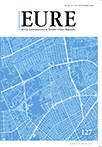Oportunidades e obstáculos para a adaptaí§í£o urbana í s alteraí§íµes climáticas na América Latina. Casos de Cidade do México, Lima e Santiago de Chile
DOI:
https://doi.org/10.4067/S0250-71612016000300011Palavras-chave:
desenvolvimento urbano, gestí£o urbana, planejamento urbanoResumo
O presente artigo analisa as oportunidades e os obstáculos í adaptaí§í£o urbana í s alteraí§íµes climáticas. É oferecido um quadro analítico com base em dois conjuntos de variáveis. Em primeiro lugar, tendo em conta as aí§íµes que dependem da informaí§í£o, dos recursos disponíveis e dos incentivos por parte dos planejadores. Em segundo lugar, sí£o consideradas variáveis associadas a efeitos colaterais, tais como as características específicas das pessoas com poder de decisí£o, o marco institucional, e os ambientes natural e socioeconí´mico correspondentes. O marco analítico é aplicado para analisar os casos de Cidade do México, Lima e Santiago do Chile. Os resultados indicam que obstáculos semelhantes e do contexto institucional desempenham um papel importante, juntamente com os desafios associados com a integraí§í£o da adaptaí§í£o, da participaí§í£o e do governo em vários níveis.
Downloads
Publicado
Como Citar
Edição
Seção
Licença
Copyright (c) 2016 Revista EURE - Revista de Estudios Urbano Regionales

Este trabalho está licenciado sob uma licença Creative Commons Attribution 4.0 International License.
Al momento de aceptar la publicación de sus artículos, los autores deberán formalizar la cesión de derechos de autor a EURE, según las condiciones establecidas por la Revista.
Ésta establece que el autor autoriza a EURE de manera gratuita, exclusiva e ilimitada a reproducir, editar, publicar, distribuir, publicitar, comercializar y traducir el artículo, a cualquier soporte conocido o por conocer y desarrollar.
Del mismo modo, los autores aseguran que el artículo propuesto es original, no publicado y no propuesto para tal fin a otro medio de difusión.


